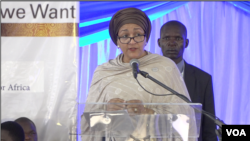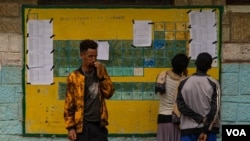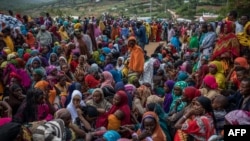The U.N. deputy secretary-general on Friday urged Ethiopians to cease fighting, rebuild trust and begin reconciliation, as the conflict in the country’s north continues to inflict unimaginable suffering on civilians.
“For me, trust has been broken in Ethiopia,” Amina Mohammed told reporters at the United Nations. “We need to find ways to support the country, the leadership, the people, find that pathway back to rebuilding that trust and, therefore, rebuilding peace for their people.”
Just back from Ethiopia, Mohammed said she got a sense from all the leaders she met in the north and in Addis Ababa that there is now more of an effort to find peace.
“Certainly, we are in a different place when I was there this week and over the weekend than we were even just a couple of months ago,” she said. “It’s how to sustain that, and how to accompany it, and to put pressure on the momentum for peace, and not to have it unravel, which it could, it’s very fragile.”
The federal government of Prime Minister Abiy Ahmed has been fighting the Tigray People’s Liberation Front (TPLF) since November 2020. A de facto government blockade on the TPLF’s stronghold of Tigray has left more than 5 million people there in dire need of humanitarian assistance; some may already be in famine conditions. The conflict has spread to neighboring Amhara and Afar, leaving an additional 4.2 million people in need of aid.
Mohammed said that the aid getting into besieged Tigray is insufficient.
“It’s a trickle,” she said.
The deputy U.N. chief attended the African Union summit in Addis Ababa last weekend and then visited the three northern conflict regions. She also went to the Somali region, which has been suffering from severe drought.
In Ethiopia’s north, she met with regional leaders and told them that “no one wins” in conflict, and she urged them to stop fighting.
“Our discussions really did focus on how to get to that path to peace: the humanitarian access, the cessation of hostilities, in some cases the lifting of the siege in Tigray,” she said. “But most importantly, the efforts they were making now at the national dialogue and how to get to that with the parties concerned.”
On December 29, the federal parliament voted to establish a commission for national dialogue. But it excludes key actors: the TPLF and the Oromo Liberation Army. They have both been declared terrorist groups by the federal government.
Local media reports say the legislature has shortlisted 42 individuals to be on the 11-person commission. The list includes academics and diplomats but only three women.
Survivors
The deputy secretary-general said it was heartbreaking to see how the social fabric has torn in northern Ethiopia. She expressed particular concern for the appalling abuses perpetrated against women.
“Ethiopian women, writ large, were affected in a way that is unimaginable,” she said. “In your worst nightmares you cannot imagine what has happened to the women in Ethiopia.”
She said atrocities have been committed across the north and she met many survivors of gang rape who shared horrific stories that affected not just herself, but the interpreters who were translating them.
She said it would be a lifelong healing process for many Ethiopian women, especially as so many have been rejected by their communities because of the violations they have endured.
“Men go to war and come home heroes, it doesn’t matter their injuries,” Mohammed said. “Women have been unimaginably injured. They are not heroes, they are outcasts. That has to stop.”
She noted that in the Afar region, where women are off-limits in conflict, the men were outraged at the abuses their women had been subjected to.
“Here, where they had witnessed their women being killed and being harmed, this is something I think they will find very difficult to get over,” she said. “The different aspects of where people feel the pain of this war, it has to be taken into that conversation of national dialogue.”






